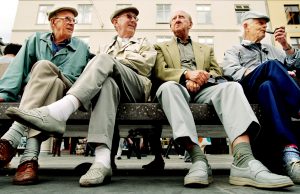This week some of the team have been in Italy for our meeting of the Healthy Ageing and Long Term Care Network. From what I have seen so far it looks like a really lively meeting! Our societies are ageing – we are (thankfully) living longer than ever before. But that comes with both challenges and responsibilities. We are challenged by growing intergenerational divides – from gentle misunderstandings to harsh resentments. This can result in a sense of competition between generations for already squeezed resources and debates about investing in future generations or caring for present. Young people still looking for their start in life are pitted against those who wish to retire and benefit from the fruit of their working lives. We also see the need for more care services as we age – and this is a reminder that we are all likely to need care services one day – and more tailored and community based services will especially be in demand. Isolation and loneliness of older people is another developing trend which needs tailored responses as does the sense of isolation and loneliness that young people can experience as they search for their first job, training or education experience. Perhaps the intergenerational divide is not so great as we imagine – or allow it to become.
So what do we do? Well, this week our members have been talking about their work in providing high quality care that has an integrated focus. This means bringing together health and social care in a much more cohesive and significant way – making caring for older people with multiple needs more effective and impactful for individuals, their families and all those who care for them. Integrated care is not rocket science – it is logic. Linking up care needs across the service spectrum has brought proven results in the health and wellbeing of older people – and having a more holistic view allows a much more satisfactory aging process than otherwise. We want to work with our members to see how we can advocate for much stronger integrated care in social and health policies – and I look forward to seeing the results of the network meeting.
But beyond policy change there is a human dimension; valuing older people in our societies. Recognising that aging does not mean that life is over – that there is still much to offer and contribute and indeed learn. That is why I am so encouraged to hear about services offered by our members that celebrate aging and the experiences and contributions that older people still make. Such projects can range from volunteering in schools to coach young people on handling money, credit cards and avoiding debt, to inter-generational housing projects, social enterprises promoting community gardens and peer supporting day centres. There is so much happening. And so much of it is looking to bridge those intergenerational divides – real or imagined. We need more of these projects and services, more opportunities to ensure that we all contribute our skills and experiences to our societies – regardless of age. In Eurodiaconia we want to continue to promote the contributions all our generations make to our societies – from the youngest to the oldest. Why don’t you join us in doing so?
